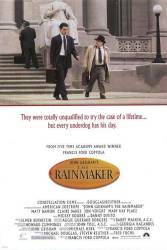Revealing mistake: During his final speech Rudy projects a video of Donny Ray on a screen. When he rolls up the screen at the end, the projection of Donny Ray's face should still be visible on the wall behind. (01:57:45)

The Rainmaker (1997)
1 revealing mistake
Directed by: Francis Ford Coppola
Starring: Matt Damon, Jon Voight, Mickey Rourke, Claire Danes
Continuity mistake: While Matt Damon is questioning the CEO of the insurance company, he removes a large book of insurance information from the CEO's lap, pushing his microphone out. He then gives the CEO a document that virtually wins the case. When he reads it, the shot clearly shows the mic is back where it shuold be. Yeah, maybe he pulled it back. But in the next shot, when Matt asks him to read it again, he comes up to him and pushes the mic back to where it was before. (01:52:55)
Rudy Baylor: There's gotta be a hundred years of law experience sitting at this very table. My staff has flunked the bar exam six times.
Question: I have two questions.1. Why would it be important, as Leo Drummond says, that his objections have to be noted, even after they are overruled? 2.After Rudy was finished with the C.E.O., Leo Drummond is allowed to ask the C.E.O. some questions, what good does it do to say that he rests on his objections?
Answer: 1) Having his objections noted into the court records would make it easier if the defense decides to appeal the verdict, allowing counsel to cite what aspects of the trail he felt were mishandled. 2) Having him repeat his objections after cross-examining the CEO reminds the jury that Drummond felt it was inappropriate to use stolen documents as evidence in the case, perhaps generating some sympathy.





Answer: 1) A lawyer has only to object one time and it be acknowledged by the judge to preserve his right of appeal related to a given legal ruling. He might choose to object a second time in order to eliminate the highly unlikely possibility that the court reporter misheard and inaccurately recorded his first objection and/or it being overruled. 2) The CEO had just been destroyed on direct examination by the plaintiff's lawyer, Rudy, to the point where no questions Drummond might ask had any chance of rehabilitating his client's testimony, and so he passed on asking any questions. Saying, "No questions, your honor, as we instead rely on our earlier objections", Drummond was making a somewhat feeble attempt to imply to the jury that the reason he wasn't asking any questions wasn't because he didn't have any that could help his case, but it was actually because they should not have been allowed in the first place. It was weak, but it was all he had under the circumstances.